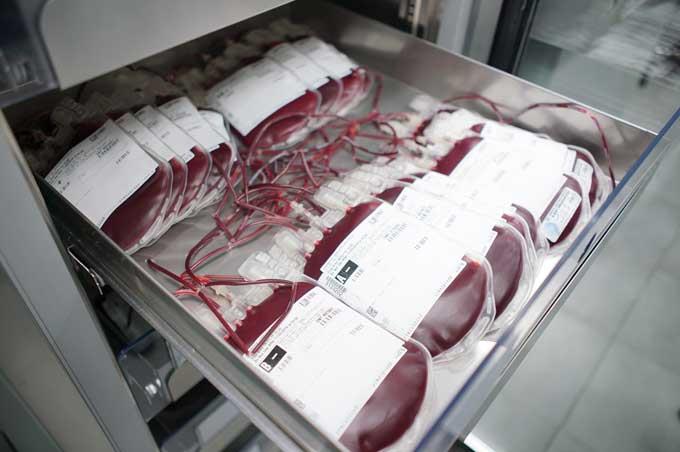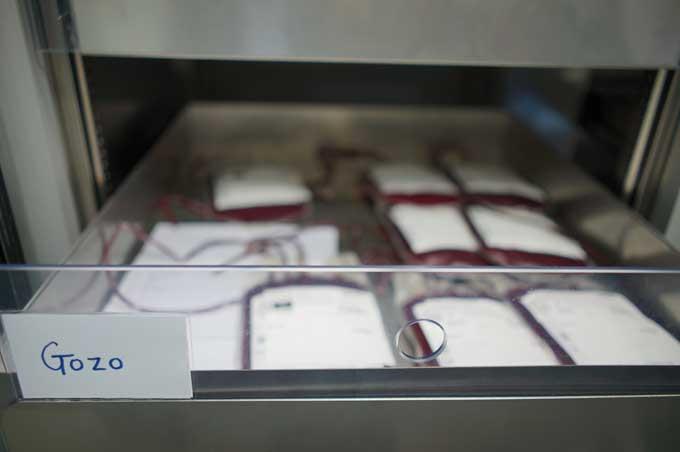As the Christmas season comes to an end and the island settles back into the hustle and bustle of daily life, the National Blood Transfusion Service Centre has also gone quiet compared to just a few weeks ago, when over 250 passed through its doors. The centre's medical director, Dr Alex Aquilina, emphasises the importance of blood donation and the need for this to become ingrained in the minds of the Maltese. He also highlights issues such as the automatic permanent deferral of gay men, which is set to cease this year, and the impact, or lack thereof, of having the mobile blood unit out of service for a number of weeks.
Number of blood donations increase in 2018
Asked whether 2018 was a good year for the centre, Dr Aquilina explains that it is hard to define what, exactly, makes a good year. "December was a busy month, with 80 to 90 blood donations a day in the week preceding Christmas. On one particular day, we received over 100 donations, and the same trend was observed in Gozo." The first week of the new year was similarly busy, he says, possibly as a result of people being and holiday and feeling more generous.
In terms of statistics, Dr Aquilina says that two figures stand out: the number of people who successfully donate blood, and callers - those who visit the centre but do not meet the necessary criteria to donate. The number of donors in 2018 increased by 271 over the previous year, which saw 15,943 donors, while the number of callers increased by 457 to a total of 22,084. Dr Aquilina explains that these figures give a more accurate picture of people's intentions.

Another factor to consider, he says, is supply and demand: "The centre's goal is to collect enough blood to meet demand, and although there have been dips in the number of blood donations throughout the years, no patient has ever been left without blood."
"On average, we need 50 units of blood each day but we aim to always have enough to cover three to four days, just to be on the safe side."
Dr Aquilina explains that an urgent appeal for donations may be made for a number of reasons, including a drop in donor numbers; a particular blood type running low; an increase in the demand for a certain blood type, such as when a single patient needs 20 to 30 units of that type.

People should not wait for an accident to donate; many need transfusions every day
Dr Aquilina says that over 100 secondary school biology students have visited the centre and that its representatives have been invited on several occasions to give talks at schools on the importance of blood donation: "One such school is St Thomas Moore College in Santa Luċija, the same school whose students highlighted the importance of organ donation during the Milied Flimkien event. President Marie-Louise Coleira Preca echoed their appeal for more blood and organ donations."
He says that whenever an accident occurs, the centre is flooded with donors, even before an appeal has been made: "Following the Paqpaqli accident, we had over 300 people here to donate. We couldn't accommodate everyone, of course, so people had to wait hours to donate. The same thing happened after the Żurrieq double-decker accident, and around 145 people came to donate blood the day after PC Simon Schembri was injured."

The main issue, he says, is that the concept of blood donation is not an ingrained part of the Maltese mentality, with many people waiting for accidents to happen before doing what should be their civic duty. He points out that most blood donations are not actually used by accident victims, but are needed by patients suffering from chronic illnesses such leukaemia. Such patients often require daily blood transfusions. That said, those who experience severe blood loss as a result of an accident or surgical complication may need 20 to 30 litres of blood a day. "Thirty years ago many people would rapidly succumb to cancer, but patients today are able to live longer thanks to the availability of blood and blood products, which is why I can't understand why people wait for an accident to happen.
'It is mainly not an issue of blood supply, but of discrimination'
Health Minister Chris Fearne announced last year that, with the introduction of nucleic acid testing (NAT), gay men would be able to donate blood in 2019. The National Blood Transfusion Service currently enforces a ban on donations made by men who have sex with men (MSM) due to the risk of HIV transmission, among other viruses. This, Dr Aquilina says, "doesn't apply solely to homosexuals, as heterosexuals may also be at risk. Here at the centre, we do not focus on morality, but on risk assessment, as potentially transmissible infections can result from a number of situations.

He says that along with new methods of testing blood, the policy will require men who have sex with men to abstain from homosexual activity for at least a year before donating blood. "I'm quite convinced that this won't significantly affect blood supply, but is an issue of discrimination. The centre has brought its policy in line with many other developed countries, as I have discussed in detail with LGBT groups."
Dr Aquilina explains that a lot of work still needs to be done, including the introduction of the new testing platform, updating questionnaire forms and training staff to carry out interviews. The new NAT equipment is effective at detecting viral infections within a shorter window period. It will also be able to detect the West Nile virus, which is now endemic to many countries in the summer months, including southern Italy and Sicily, southern France, Greece and Croatia. He explains that many Maltese donors visit these countries over the summer, which would explain the slump in donations during this period. Dr Aquilina hopes that numbers will improve with the introduction of NAT.

Case of the mobile blood unit
Dr Aquilina says that what matters most is the number of people who donate blood, regardless of whether the mobile blood unit is available. He recounts one occasion when the mobile unit was out of service for an entire year, yet the centre saw a record number of donations. "I'm not saying that the mobile unit doesn't help - it is convenient and a great means of promotion. But most people drive nowadays, and even if they don't, a number of buses pass by the centre, which is open every day, including Sundays and public holidays. There is also a blood donation centre in Gozo, so if anyone wants to donate, they can do so easily."
The van is currently going through repairs for a leaky roof but is expected to be ready within the next few days. "I wish to see people given time off from work to donate," Dr Aquilina says, "or, when a company celebrates an event, they could include blood donation as part of the activities. In some places around Europe, companies compete to see whose employees donate the most blood. I hope social awareness of blood donation and saving lives continues to grow." He concludes by thanking all those who donated in 2018 and those who have helped in other ways, including the media.

Photos by Luke Zerafa